Maruti Suzuki Case Study
VerifiedAdded on 2019/11/29
|5
|863
|165
Case Study
AI Summary
This case study examines Maruti Suzuki India Limited's journey, highlighting its challenges and HR strategies in a competitive Indian automotive market. The company faces intense competition from both domestic and international players, necessitating innovative HR practices to retain talent and foster a culture of innovation. The study explores solutions such as creating a supportive organizational culture, promoting innovation, and implementing effective talent retention strategies. An evaluation plan is proposed to assess and improve these activities, including clear goals, timelines, and stakeholder involvement. The case study emphasizes the importance of adapting to the dynamic business landscape and the crucial role of HR in achieving sustainable competitive advantage.
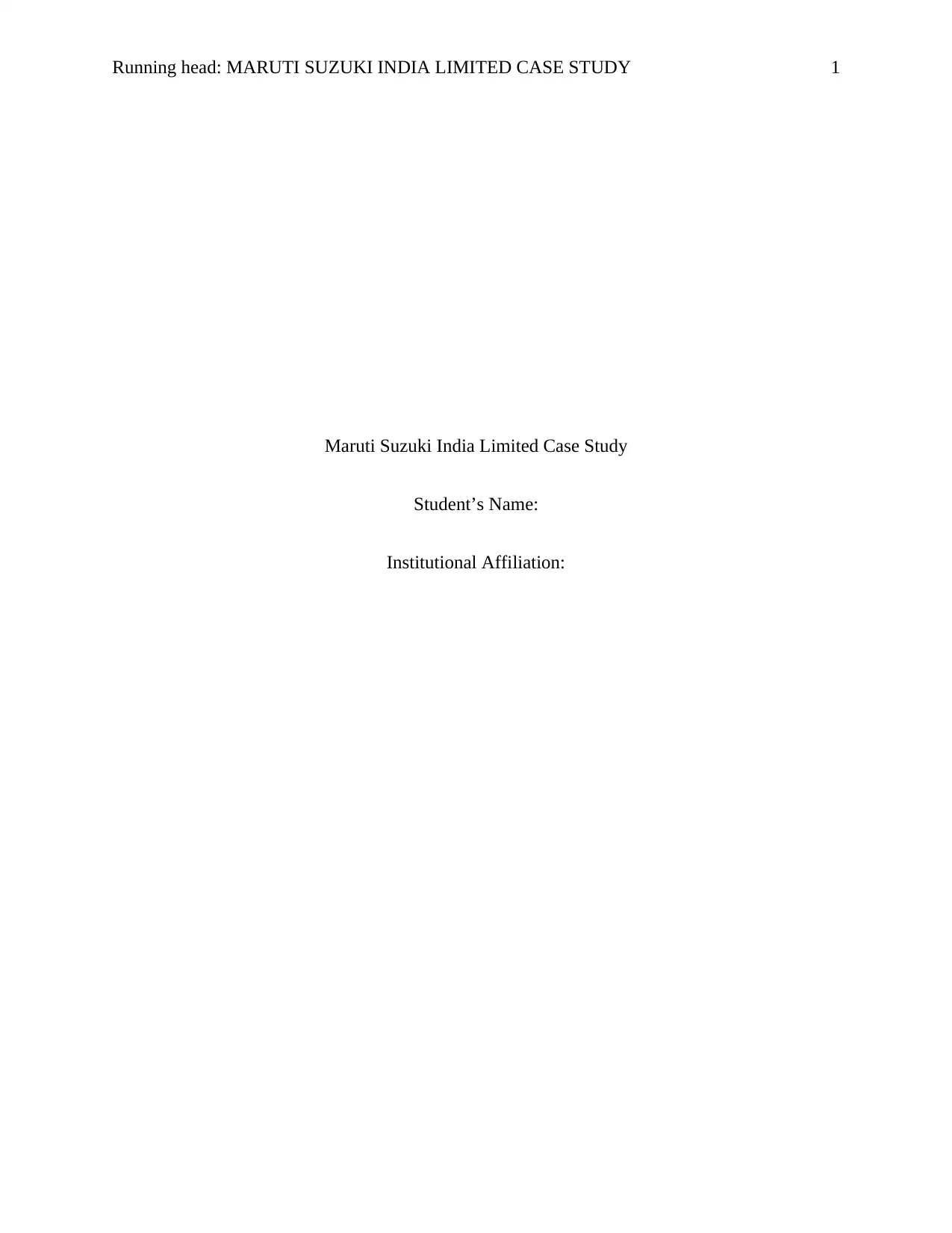
Running head: MARUTI SUZUKI INDIA LIMITED CASE STUDY 1
Maruti Suzuki India Limited Case Study
Student’s Name:
Institutional Affiliation:
Maruti Suzuki India Limited Case Study
Student’s Name:
Institutional Affiliation:
Paraphrase This Document
Need a fresh take? Get an instant paraphrase of this document with our AI Paraphraser
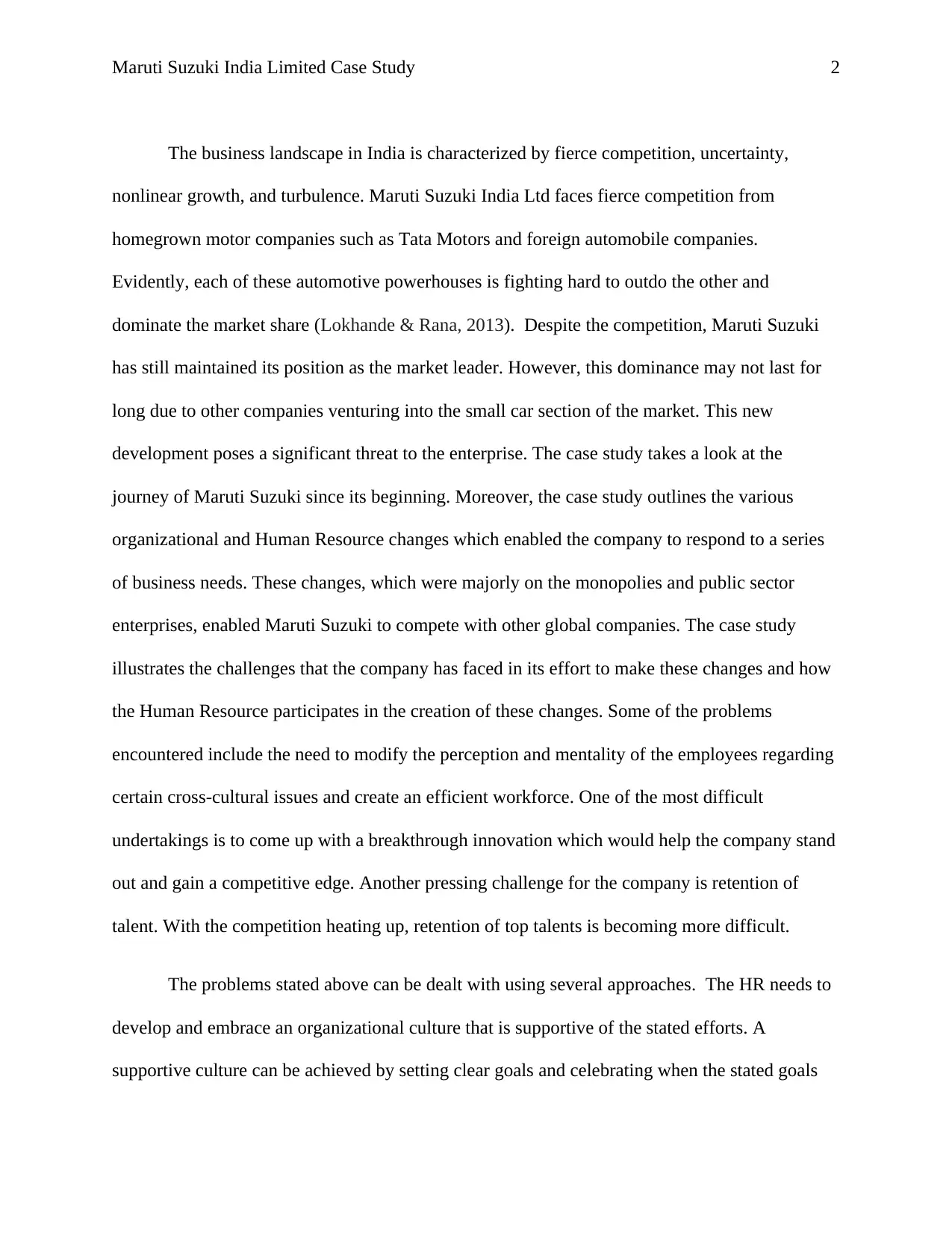
Maruti Suzuki India Limited Case Study 2
The business landscape in India is characterized by fierce competition, uncertainty,
nonlinear growth, and turbulence. Maruti Suzuki India Ltd faces fierce competition from
homegrown motor companies such as Tata Motors and foreign automobile companies.
Evidently, each of these automotive powerhouses is fighting hard to outdo the other and
dominate the market share (Lokhande & Rana, 2013). Despite the competition, Maruti Suzuki
has still maintained its position as the market leader. However, this dominance may not last for
long due to other companies venturing into the small car section of the market. This new
development poses a significant threat to the enterprise. The case study takes a look at the
journey of Maruti Suzuki since its beginning. Moreover, the case study outlines the various
organizational and Human Resource changes which enabled the company to respond to a series
of business needs. These changes, which were majorly on the monopolies and public sector
enterprises, enabled Maruti Suzuki to compete with other global companies. The case study
illustrates the challenges that the company has faced in its effort to make these changes and how
the Human Resource participates in the creation of these changes. Some of the problems
encountered include the need to modify the perception and mentality of the employees regarding
certain cross-cultural issues and create an efficient workforce. One of the most difficult
undertakings is to come up with a breakthrough innovation which would help the company stand
out and gain a competitive edge. Another pressing challenge for the company is retention of
talent. With the competition heating up, retention of top talents is becoming more difficult.
The problems stated above can be dealt with using several approaches. The HR needs to
develop and embrace an organizational culture that is supportive of the stated efforts. A
supportive culture can be achieved by setting clear goals and celebrating when the stated goals
The business landscape in India is characterized by fierce competition, uncertainty,
nonlinear growth, and turbulence. Maruti Suzuki India Ltd faces fierce competition from
homegrown motor companies such as Tata Motors and foreign automobile companies.
Evidently, each of these automotive powerhouses is fighting hard to outdo the other and
dominate the market share (Lokhande & Rana, 2013). Despite the competition, Maruti Suzuki
has still maintained its position as the market leader. However, this dominance may not last for
long due to other companies venturing into the small car section of the market. This new
development poses a significant threat to the enterprise. The case study takes a look at the
journey of Maruti Suzuki since its beginning. Moreover, the case study outlines the various
organizational and Human Resource changes which enabled the company to respond to a series
of business needs. These changes, which were majorly on the monopolies and public sector
enterprises, enabled Maruti Suzuki to compete with other global companies. The case study
illustrates the challenges that the company has faced in its effort to make these changes and how
the Human Resource participates in the creation of these changes. Some of the problems
encountered include the need to modify the perception and mentality of the employees regarding
certain cross-cultural issues and create an efficient workforce. One of the most difficult
undertakings is to come up with a breakthrough innovation which would help the company stand
out and gain a competitive edge. Another pressing challenge for the company is retention of
talent. With the competition heating up, retention of top talents is becoming more difficult.
The problems stated above can be dealt with using several approaches. The HR needs to
develop and embrace an organizational culture that is supportive of the stated efforts. A
supportive culture can be achieved by setting clear goals and celebrating when the stated goals
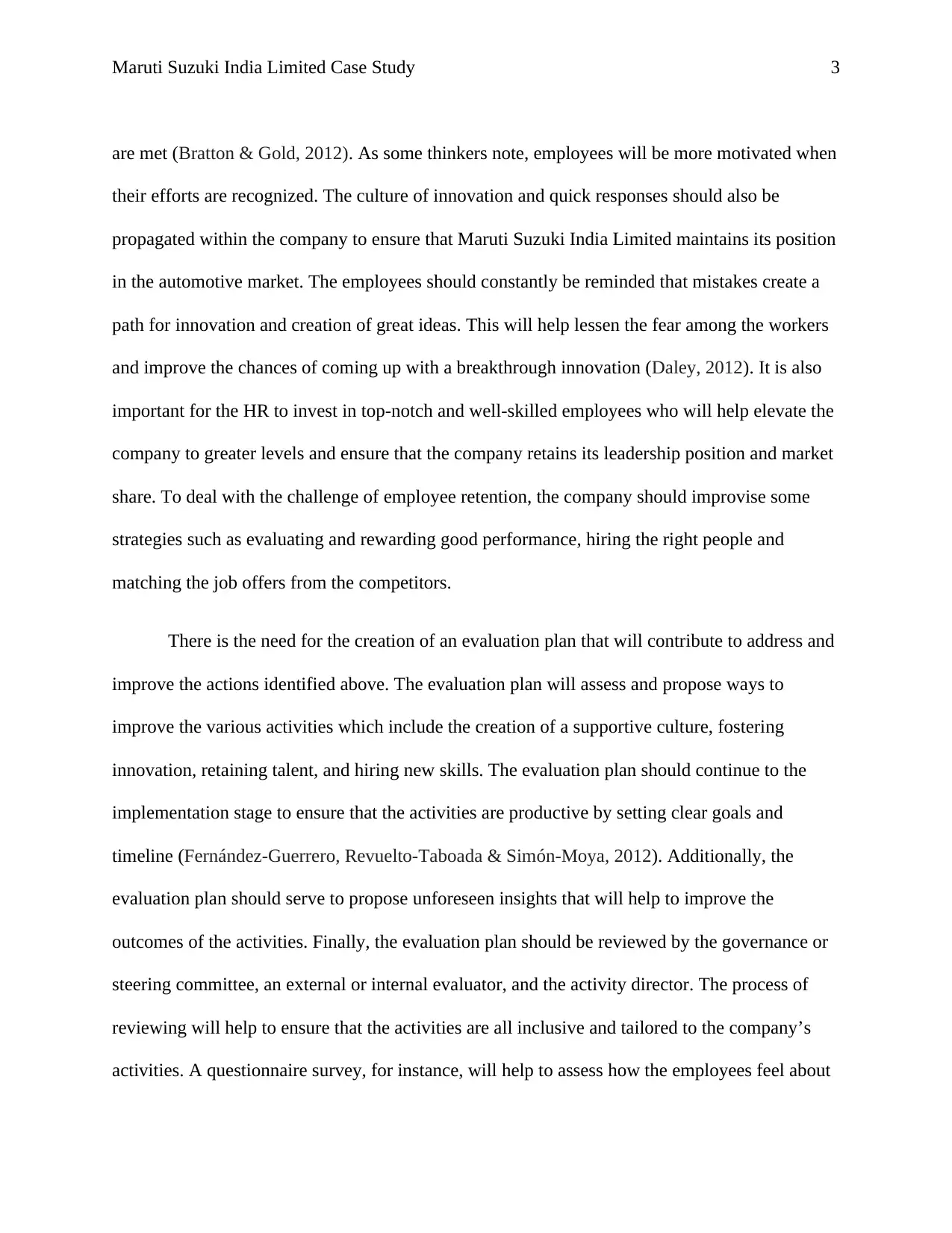
Maruti Suzuki India Limited Case Study 3
are met (Bratton & Gold, 2012). As some thinkers note, employees will be more motivated when
their efforts are recognized. The culture of innovation and quick responses should also be
propagated within the company to ensure that Maruti Suzuki India Limited maintains its position
in the automotive market. The employees should constantly be reminded that mistakes create a
path for innovation and creation of great ideas. This will help lessen the fear among the workers
and improve the chances of coming up with a breakthrough innovation (Daley, 2012). It is also
important for the HR to invest in top-notch and well-skilled employees who will help elevate the
company to greater levels and ensure that the company retains its leadership position and market
share. To deal with the challenge of employee retention, the company should improvise some
strategies such as evaluating and rewarding good performance, hiring the right people and
matching the job offers from the competitors.
There is the need for the creation of an evaluation plan that will contribute to address and
improve the actions identified above. The evaluation plan will assess and propose ways to
improve the various activities which include the creation of a supportive culture, fostering
innovation, retaining talent, and hiring new skills. The evaluation plan should continue to the
implementation stage to ensure that the activities are productive by setting clear goals and
timeline (Fernández-Guerrero, Revuelto-Taboada & Simón-Moya, 2012). Additionally, the
evaluation plan should serve to propose unforeseen insights that will help to improve the
outcomes of the activities. Finally, the evaluation plan should be reviewed by the governance or
steering committee, an external or internal evaluator, and the activity director. The process of
reviewing will help to ensure that the activities are all inclusive and tailored to the company’s
activities. A questionnaire survey, for instance, will help to assess how the employees feel about
are met (Bratton & Gold, 2012). As some thinkers note, employees will be more motivated when
their efforts are recognized. The culture of innovation and quick responses should also be
propagated within the company to ensure that Maruti Suzuki India Limited maintains its position
in the automotive market. The employees should constantly be reminded that mistakes create a
path for innovation and creation of great ideas. This will help lessen the fear among the workers
and improve the chances of coming up with a breakthrough innovation (Daley, 2012). It is also
important for the HR to invest in top-notch and well-skilled employees who will help elevate the
company to greater levels and ensure that the company retains its leadership position and market
share. To deal with the challenge of employee retention, the company should improvise some
strategies such as evaluating and rewarding good performance, hiring the right people and
matching the job offers from the competitors.
There is the need for the creation of an evaluation plan that will contribute to address and
improve the actions identified above. The evaluation plan will assess and propose ways to
improve the various activities which include the creation of a supportive culture, fostering
innovation, retaining talent, and hiring new skills. The evaluation plan should continue to the
implementation stage to ensure that the activities are productive by setting clear goals and
timeline (Fernández-Guerrero, Revuelto-Taboada & Simón-Moya, 2012). Additionally, the
evaluation plan should serve to propose unforeseen insights that will help to improve the
outcomes of the activities. Finally, the evaluation plan should be reviewed by the governance or
steering committee, an external or internal evaluator, and the activity director. The process of
reviewing will help to ensure that the activities are all inclusive and tailored to the company’s
activities. A questionnaire survey, for instance, will help to assess how the employees feel about
⊘ This is a preview!⊘
Do you want full access?
Subscribe today to unlock all pages.

Trusted by 1+ million students worldwide
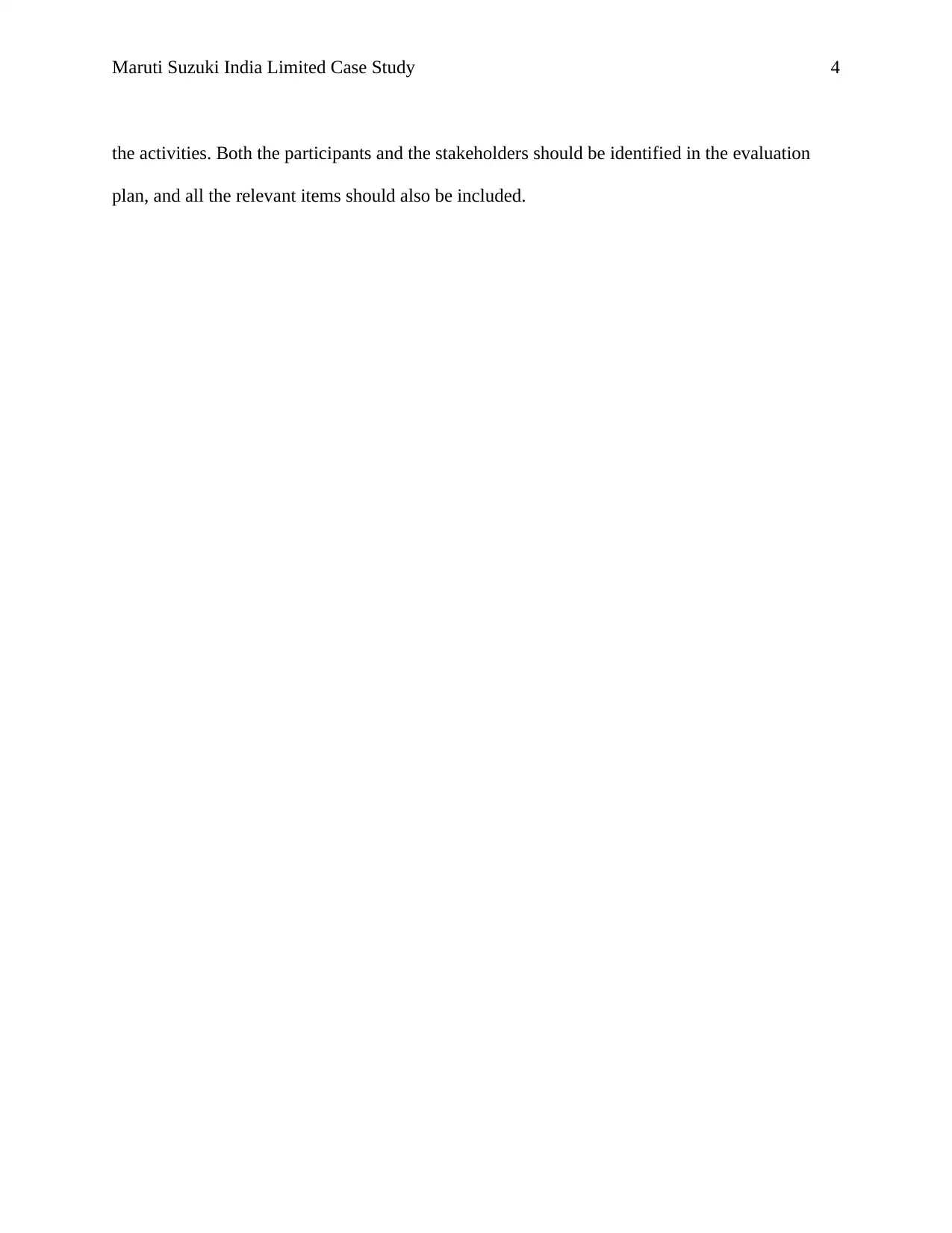
Maruti Suzuki India Limited Case Study 4
the activities. Both the participants and the stakeholders should be identified in the evaluation
plan, and all the relevant items should also be included.
the activities. Both the participants and the stakeholders should be identified in the evaluation
plan, and all the relevant items should also be included.
Paraphrase This Document
Need a fresh take? Get an instant paraphrase of this document with our AI Paraphraser
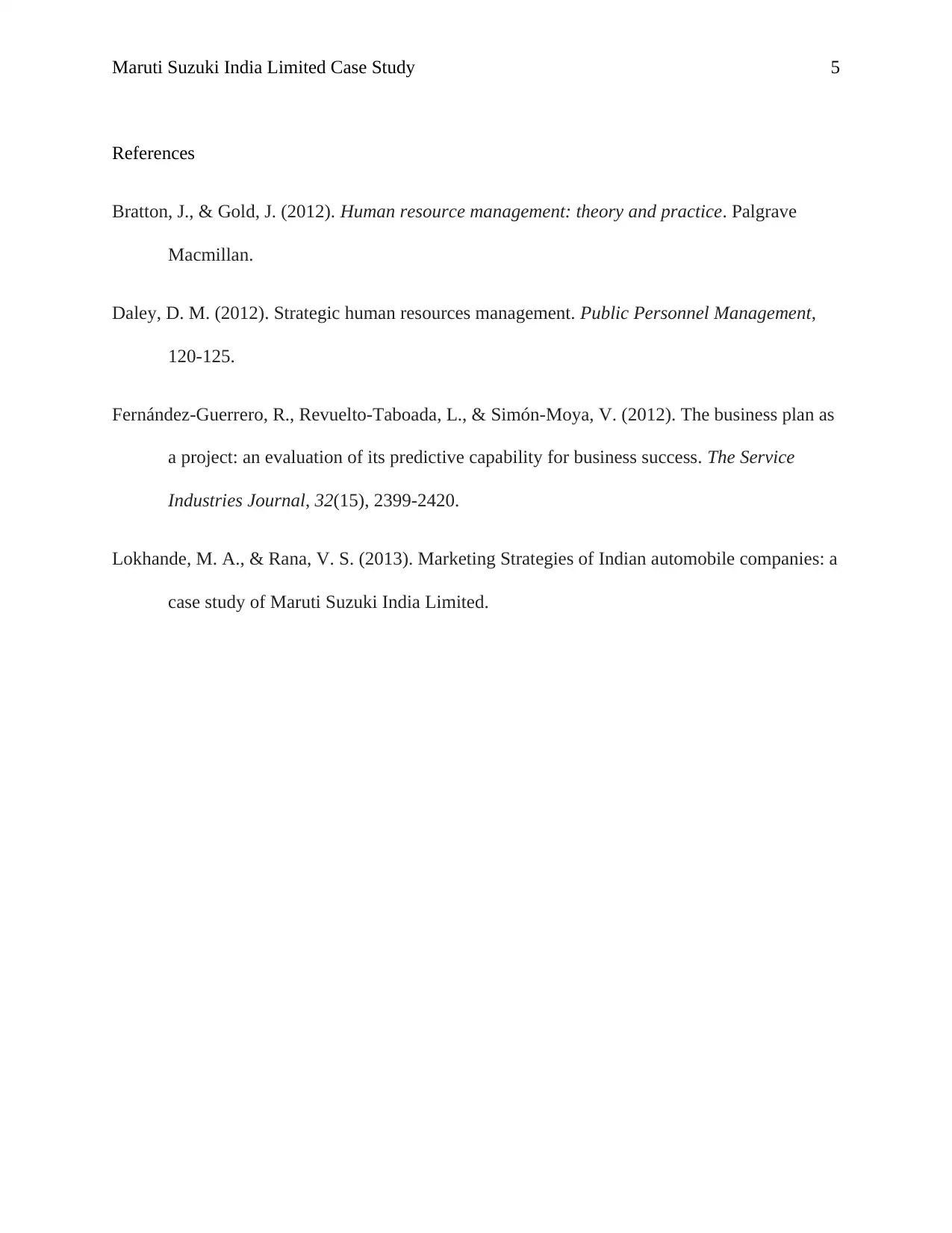
Maruti Suzuki India Limited Case Study 5
References
Bratton, J., & Gold, J. (2012). Human resource management: theory and practice. Palgrave
Macmillan.
Daley, D. M. (2012). Strategic human resources management. Public Personnel Management,
120-125.
Fernández-Guerrero, R., Revuelto-Taboada, L., & Simón-Moya, V. (2012). The business plan as
a project: an evaluation of its predictive capability for business success. The Service
Industries Journal, 32(15), 2399-2420.
Lokhande, M. A., & Rana, V. S. (2013). Marketing Strategies of Indian automobile companies: a
case study of Maruti Suzuki India Limited.
References
Bratton, J., & Gold, J. (2012). Human resource management: theory and practice. Palgrave
Macmillan.
Daley, D. M. (2012). Strategic human resources management. Public Personnel Management,
120-125.
Fernández-Guerrero, R., Revuelto-Taboada, L., & Simón-Moya, V. (2012). The business plan as
a project: an evaluation of its predictive capability for business success. The Service
Industries Journal, 32(15), 2399-2420.
Lokhande, M. A., & Rana, V. S. (2013). Marketing Strategies of Indian automobile companies: a
case study of Maruti Suzuki India Limited.
1 out of 5
Related Documents
Your All-in-One AI-Powered Toolkit for Academic Success.
+13062052269
info@desklib.com
Available 24*7 on WhatsApp / Email
![[object Object]](/_next/static/media/star-bottom.7253800d.svg)
Unlock your academic potential
Copyright © 2020–2025 A2Z Services. All Rights Reserved. Developed and managed by ZUCOL.




